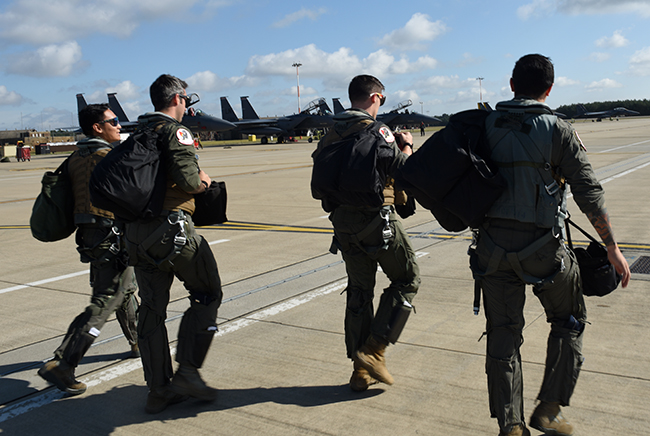
Aircrew assigned to the 494th Fighter Squadron walk to their aircraft on the flightline in preparation to participate in exercise Point Blank 19-4 at Royal Air Force Lakenheath, England, Aug. 29, 2019. Air Force photo by A1C Rhonda Smith.
Nearly half of all veterans who served after 9/11 blame deployment for a decline in their mental health, regardless of whether they saw combat, according to a Sept. 10 Pew Research Center report. Forty-seven percent of those vets also reported “emotionally traumatic or distressing experiences” linked to their time in uniform.
In the 18 years since hijackers flew planes into buildings in New York and Virginia, as well as a field in Pennsylvania, spurring America into war, slightly more than one-third of post-9/11 veterans believe that they developed post-traumatic stress from serving, according to Pew. Only 35 percent said they sought help for the resulting emotional issues.
That stands in stark contrast to how veterans who served before the terror attacks dealt with mental health, in part because previous generations deployed fewer times. Seventeen percent of all veterans—with or without combat experience—who finished serving before 9/11 said deploying took a negative toll on their mental health, the report said.
Twenty-five percent of all pre-9/11 vets also pointed to emotional trauma or distress while serving, and 14 percent reported service-related PTS. Only 10 percent said they asked for help.
Responses from veterans who served in a combat zone and had at least one “key combat engagement” show a similar divide, according to Pew. Slightly more than half of combat veterans who served in the post-9/11 era reported feeling the negative effects of deployment on mental health, compared to 28 percent for combat vets who came before 9/11.
About three-quarters of all veterans of the Afghanistan War and other modern conflicts deployed overseas at least once, according to the report, versus nearly 60 percent of those who served in earlier wars.
However, “post-9/11 veterans are about twice as likely as their pre-9/11 counterparts to have served in a combat zone,” Pew added.
The center’s deep dive looked at the effects of deployment and combat experience, the process of transitioning into civilian life, finding jobs after leaving the military, and civilian-military perceptions. Researchers surveyed more than 1,200 veterans who served on Active Duty or as mobilized Reservists before and after 9/11.
This story has been updated to correct that 17 percent of all veterans—with or without combat experience–who finished serving before the Sept. 11 attacks said deploying was detrimental to their mental health.